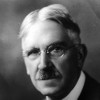“ When an activity is its own end in the sense that the action of the moment is complete in itself, it is purely physical ”
John Dewey, Democracy and Education (1916). copy citation
| Author | John Dewey |
|---|---|
| Source | Democracy and Education |
| Topic | action activity |
| Date | 1916 |
| Language | English |
| Reference | |
| Note | |
| Weblink | http://www.gutenberg.org/files/852/852-h/852-h.htm |
Context
“The statement is correct, but it is falsely taken, if supposed to mean that play activity is momentary, having no element of looking ahead and none of pursuit. Hunting, for example, is one of the commonest forms of adult play, but the existence of foresight and the direction of present activity by what one is watching for are obvious. When an activity is its own end in the sense that the action of the moment is complete in itself, it is purely physical; it has no meaning (See p. 77) . The person is either going through motions quite blindly, perhaps purely imitatively, or else is in a state of excitement which is exhausting to mind and nerves. Both results may be seen in some types of kindergarten games where the idea of play is so highly symbolic that only the adult is conscious of it.”
source


